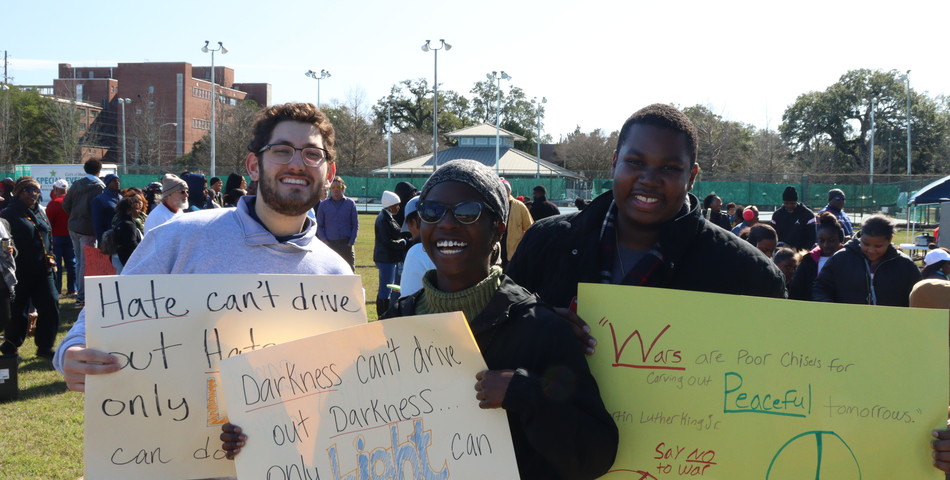“Wars are poor chisels for carving out peaceful tomorrows” decorated the signs of many peaceful protesters in attendance at Mobile’s annual march and rally held in honor of the civil rights activist and theologian, many affectionately abbreviate as MLK.
King was born on Jan. 15, 1929 and was assassinated on April 4, 1968. His spirit and sayings, like the quote above, live on inspiring millions of people like those in attendance on Jan. 20 at Lyons Park downtown for the rally following the march.
MLK Day was made a federal holiday in 1986, however, it was not upheld by every state until 2000. The holiday was coined as “a day on, not a day off” meaning true celebration of the day is the act of devoting the down time to service for others. This is a principle that students from Spring Hill College as well as those from the University of South Alabama understand well. Many were in attendance at the event carrying protest signs, joining in festivities, and even performing for the crowd that had gathered to remember the civil rights leader.
Although some parts of the day were celebratory, for many in attendance, such as one junior political science major, Lauryn Herman, the march served as a bittersweet reminder of all the progress still left to be made. “Even though it was supposed to be an occasion where we were uplifting and remembering Martin Luther King, it was kind of sad, especially because MLK wanted to fight for justice and equality but we were walking through this predominantly black neighborhood, and the infrastructure was falling apart, it was poor and didn’t look like a great place to live in,” said Herman.
The event was organized by People United to Advance the Dream, and its president Pastor David Edwards, who spoke at the event. Edwards hoped to show all who were in attendance that “Dr. King changed the laws with his beliefs, his moral integrity and justice.” in hopes that “America would look like what she says she is.” At the rally, God’s Tribe, a student group from the University of South Alabama led the crowd in worship songs. Other performances such as one from a local rapper and another from a children’s dance group, followed the day’s theme of conquering hardship with the help of faith. The crowd’s readiness to serve was shown when all who were left in attendance at the end of the event helped to clean up the chairs, trash and load up the sound equipment.
Students from SHC are no strangers to the idea of serving others. In fact, engaging in service has been a long-standing tradition after Albert S. Foley, the sociology professor for whom the college’s Foley Service Center is named, engaged in quite a lot of civil rights activism. According to an article written on apr.org about King and SHC’s relationship, Foley did not fear the Klu Klux Klan and refused to stay quiet about the college’s historic decision to integrate. King praised the college in his famous “Letter from the Birmingham Jail” for being the first school in Alabama to allow black students to attend before the court’s decision in the case of Brown v. Board of Education.
